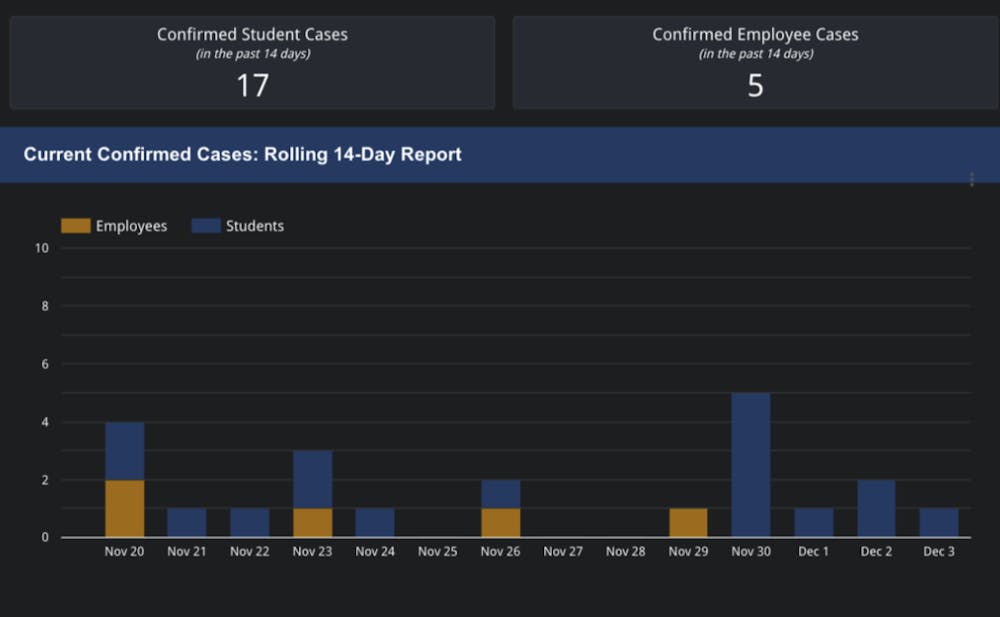By Alessia Contuzzi
Staff Writer
Following the Thanksgiving break and an increase in Covid-19 cases statewide, the College is combating the possible spread with a three-pronged approach to testing, according to an email sent to students on Nov. 29 by Director of Student Health Services Janice Vermeychuk.
The College looks to monitor and lower the infection rate on campus in a timely manner using a three-pronged approach consisting of mandatory, random and voluntary testing.
In compliance with the restrictions set in the beginning of the semester, unvaccinated community members with exemptions must be tested weekly in order to remain on campus. These tests are conducted in the Decker Hall Social Space by Bergen New Bridge Medical Center, which is the College’s on-campus testing partner. In addition to testing unvaccinated students, the random and targeted testing method was introduced in an email from Vermeychuk on Sept. 23.
“While there is no cause for alarm, it is important that we are proactive in screening all members of our community to better ensure a safe and healthy campus,” Vermeychuk wrote in the Sept. 23 email. “You will receive an email with instructions from the Covid-19 Testing Coordinator if you are selected for testing. The test site is in [the] Decker Social Space. Test results from off-campus test sites, at-home/self-tests and antibody tests cannot be accepted.”
Selected students will be notified of random testing via an email from testcomply@tcnj.edu during or before the week of Dec. 6, and are expected to follow the instructions given to receive a test. The third approach, voluntary testing, encourages students who have symptoms, came in close contact with Covid-19 or have taken part in high risk activities to get tested. Registration and scheduling links can be found on the Fall Return website.
In a poll conducted on The Signal’s Instagram, 34% of the 313 students polled said that they were selected for random testing. Students have mixed feelings on the approach. Some feel it is necessary and helpful, while others think it should not be implemented unless there is a prominent increase.
“It’s very proactive, and especially after fall break people won’t get tested and continue to go to Eickhoff without understanding that their cold could be Covid-19,” said sophomore secondary English urban education major, Kiara Fernandez. “I think the College is doing the right thing because my roommate and I have got the random Covid-19 testing and if anything we appreciate it. It’s quick, and it makes sense especially amid a new variant and Thanksgiving break where people travelled.”
On the other hand, freshman history and secondary education major Bruce Cohen expressed discontent with the testing approach.
“It’s a waste of resources to test people who in all likelihood don’t have the virus,” Cohen said. “I also don’t truly understand their reasoning behind doing it, [like] they feel people aren’t getting tested when they should be.”
Prior to break, Vermeychuk and Associate Vice President for Strategic Human Resources Kimberly Woods reminded students of the proper guidelines and protocols from the New Jersey Department of Health to limit the spread of Covid-19 in an email to students on Nov. 18. Wearing masks, social distancing and celebrating with fully vaccinated individuals was encouraged.
President Foster followed this information up in a Nov. 23 email and started the semester recap with the increase in Covid-19 cases, referring students to Vermeychuk and mentioning the restart of random testing after break. On that day, there were 18 positive cases in 14 days within the campus community, which raised concern. As of Dec. 3, there are 17.
“We are experiencing an increase in Covid-19 cases. Particularly as you head home for the Thanksgiving holiday, please heed the advice in the November 18 email from Janice Vermeychuk and Kimberly Woods to remain vigilant and careful about health and safety,” Foster said in the email. “Thank you for your compliance and efforts to thwart a virus still circulating in our environment.”
With the three-pronged approach to testing and the enforcement of proper protocols, the College hopes to control any potential spread of Covid-19 on campus through the remainder of the fall semester.







